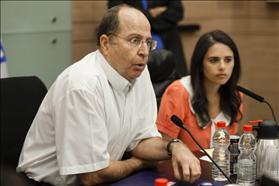Framing empty rhetoric as equality
Hiddush releases guide to the Equality in Sharing the Burden Law: Nothing but defects and exemptions
On the eve of the Knesset vote on the ultra-Orthodox draft law, Hiddush presents a guide to the law's defects and call's on the government coalition to send the bill back to the drawing board.
12/03/2014 11:41
Tags: equality in sharing the burden · haredi draft · Shaked Committee · IDF

Defense Minister Moshe Ya'alon and Chair of the Committee to draft the Equality in Sharing the Burden Law MK Ayelet Shaked of Habayit Hayehudi in committee meeting. 9.15.2013. Photo: Flash90
Hiddush- Freedom of Religion for Israel has prepared a brief guide to the major defects found in the draft amendment of the Security Service and National Service Bills. These legislative proposals, which are intended to generate ultra-Orthodox enlistment and equality in sharing the national burden, will be voted on this Wednesday, March 12, 2014.
The conclusion that these laws will fail in fulfilling the principle of equality is not only drawn by observers such as Hiddush, but has been admitted by some of the bill's own sponsors. The chair of the committee tasked with preparing the law, MK Ayelet Shaked from HaBayit Hayehudi, said: "Anyone who talks about equal civic responsibility is making a mistake. There is no equality." Similarly, MK Yoni Chetboun, also from Habayit Hayehudi said that his intention was to produce a "punctured draft law," to avoid drafting ultra-Orthodox yeshiva students.
Reacting to the proposed legislation, Hiddush CEO Rabbi Uri Regev said, "This is a clear example of a law designed to make headlines and promote Facebook posts, but will not benefit the public. Whoever hopes that the law will fulfill the principle of equality needs to know that, in practice, this law will perpetuate inequality. Once again, the politicians chose to disregard the public's desire for equality and the Supreme Court's ruling that annulled the mass haredi army exemptions”.
Rabbi Regev noted that "the law has ironically succeeded in increasing tensions between the government and the haredi community even though it will not result in drafting yeshiva students, but, instead, will hand them large scale exemptions. It is difficult to understand how they succeeded in stuffing so many defective clauses into one law." He called on the Knesset to "do the right thing and send the law back to the Shaked Committee to change it completely."
In light of these clearly defective law proposals, Hiddush's Vice President for Research and Information Shahar Ilan prepared this guide to highlight the law's following deficiencies:
• There will be no compulsory service for yeshiva students until 2017, and there are no sanctions for those who do not serve. Instead, there will only be target quotas. The decision to enlist is entirely up to the student.
Once again, the politicians chose to disregard the public's desire for equality and the Supreme Court's ruling that annulled the mass haredi army exemptions
• The law will not be implemented until after the next elections and Knesset term. A new government coalition can decide to change the law or cancel the compulsory draft.
• If and when the draft law is implemented, only students above age 21 will be conscripted. This is unfortunate, since older (and married) soldiers are less effective and cost the army more.
• When the law goes into effect, close to 30,000 yeshiva students between the ages of 22-28 will be given full exemption from army service.
• Similarly, close to 20,000 additional yeshiva students between the ages of 18 and 22 years at the time of the law's implementation will receive a full exemption at age 24. Instead of giving ultra-Orthodox young men an incentive to enlist, this will serve as a hindrance, undermining the stated purpose of the law.
• Once compulsory service goes into effect, it will be enforced using prison sanctions. It is unrealistic and counterproductive to attempt to jail the thousands of yeshiva students who will ignore their draft calls.
• The Hesder yeshiva program (combining yeshiva and army for Zionist Orthodox Israelis) was lengthened only by one month from 16 months to 17 months, thus continuing to serve for a significantly shorter period of time than the general population that serves for 36 months.
• The draft quotas, that would encompass a minority of Haredi young men, set by the government, can easily be further lowered with the right political pressure.
• The provision allowing for 300 yeshiva students to perform national service in education is nothing but another opportunity to use national service to receive in-kind funding for haredi education and Orthodox Jewish evangelization.
• 100 positions in national service will be provided to ZAKA, in spite of the fact that major financial disorders have been uncovered in its operations. Another 100 positions will be given to Chabad emissaries around the world, even though the organization is Anti-Zionist and has a stated missionary religious goal.